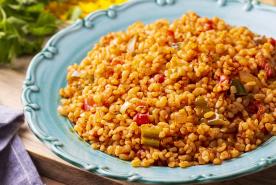Last updated: January 02, 2023
Medically reviewed by: NKF Patient Education Team
Pomegranates are rich in potassium and low in phosphorus and sodium. Check with your healthcare provider to see how much is safe for your kidney disease stage or dialysis type.
Pomegranates are sweet and tart fruits that are high in antioxidants. Eating pomegranates may have many health benefits.
Why are pomegranates superfoods?
- Pomegranates are high in fiber, folate, vitamin K, vitamin E, vitamin B6, and potassium.
- Pomegranates have three times the number of antioxidants than green tea, which are shown to reduce inflammation.
- Pomegranates are seasonal and may not always be available in your store. You can freeze pomegranates, but only freeze the seeds instead of the whole fruit to take up less space.
- You can eat them plain or add them to salads, smoothies, or on top of yogurt or oatmeal.
Pomegranates and kidney disease
Pomegranates are a high-potassium food. They are also low in phosphorus and sodium. The amount you can have will depend on your stage of kidney disease or the type of dialysis you receive.
Chronic kidney disease and transplant
Most people with kidney disease do not have to limit pomegranates due to potassium. If your laboratory results show higher levels of potassium, a kidney dietitian may talk with you about how much to eat.
Pomegranates may interfere with some transplant medications so if you have a kidney transplant you may need to avoid pomegranates.
Hemodialysis (3 times/week)
Patients on hemodialysis may need to limit pomegranates. Use the chart below and work with your kidney dietitian to choose the amount of pomegranate that will fit your kidney diet plan.
Daily home and nocturnal dialysis or peritoneal dialysis
These types of dialysis can remove more potassium, so you may need to eat more potassium-rich foods. Pomegranates can give you the potassium you need. Work with your kidney dietitian to create a meal plan that allows you to safely consume pomegranates.
Kidney stones
Eating pomegranates will not have an effect on forming kidney stones.
How do you cut a pomegranate?
- Cut the top stem off. This will reveal the red seeds and a white membrane.
- You will notice “sections” of the fruit, similar to an orange. Score the outside of the skin with a sharp knife, cutting just enough through the membrane but not into the red fruit. Do this the entire way around the pomegranate.
- Once the entire pomegranate is scored, pull the fruit apart in sections. Enjoy the red seeds and discard the white membrane as this is very bitter.
Recipe: pomegranate brûlée
Serving size: 1/4 recipe
Makes: 4 servings
Ingredients
- ½ cup light sour cream
- ½ cup plain cream cheese, at room temperature
- ¼ cup brown sugar, divided
- ¼ teaspoon ground allspice
- 1 cup fresh pomegranate seeds
Instructions
- Preheat oven to broil
- In a small bowl, beat together the sour cream, cream cheese, 2 tablespoons brown sugar, and cinnamon for about 4 minutes or until the mixture is very smooth and fluffy.
- Evenly divide the pomegranates among 4 (4-ounce) ramekins.
- Spoon the cream cheese mixture over the pomegranates and smooth the tops.
- Store the ramekins in the refrigerator, covered, until you are ready to serve the dessert.
- Sprinkle ½ tablespoon brown sugar evenly over each ramekin.
- Place ramekins on a baking sheet and broil 4 inches from the heating element until the sugar is caramelized and golden brown.
- Remove from the oven. Let the brûlées sit for 1 minute and serve.
Nutrients per serving
Calories...186
Fat...8 g
Carbohydrates...26 g
Sodium...131 mg
Protein...4 g
Calcium...101 mg
Potassium...257 mg
Phosphorus...80 mg
This recipe was adapted from Zogheib S. The Renal Diet Cookbook. Rockridge Press, CA; 2015.

















